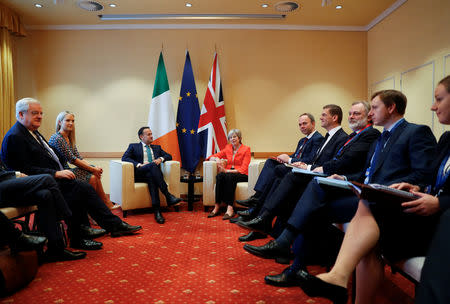Highlights: EU leaders comments on Brexit at informal summit in Austria

SALZBURG, Austria (Reuters) - European Union leaders met in Salzburg, Austria, for an informal summit to discuss migration and Brexit. Below are comments of leaders arriving on Thursday.
IRISH PRIME MINISTER LEO VARADKAR
"I had a very good meeting this morning with Prime Minister May and her team. Time is running short. There's proposals for another summit in October and then in November. Ireland is a country that obviously wants to avoid a no deal scenario, we want to avoid a no deal Brexit, (but) we are preparing for that, we are hiring extra staff and officials, putting in IT systems, we're ready for that eventuality should it occur. But I think we need to double our efforts over the next couple of weeks to make sure that we have a deal."
BELGIAN PRIME MINISTER CHARLES MICHEL
"Today I can see that it is necessary to make all the steps because the proposals are not enough in order to have an agreement."
EUROPEAN COMMISSION PRESIDENT JEAN-CLAUDE JUNCKER
ON THE PRESENTATION OF BRITISH PM THERESA MAY ON WEDNESDAY
"It was interesting, it was polite, it was not aggressive. She is doing her job."
LUXEMBOURG PRIME MINISTER XAVIER BETTEL
"We listened to Teresa May yesterday, I think that she told us the efforts the British government did, and today we listen to Michel Barnier on the different points. I still believe that there's some difficult points. I fully believe that we will be able to find an agreement."
"It's a compromise from both sides, it's not on one side."
AUSTRIAN CHANCELLOR SEBASTIAN KURZ
"You know that, as before, the approaches are very different. But to report something positive, inside the room, away from the hard media statements outside, I think both sides are aware that they will only reach a solution if they move towards each other."
(Reporting by Philip Blenkinsop, Daphne Psaledakis and Jan Strupczewski)

